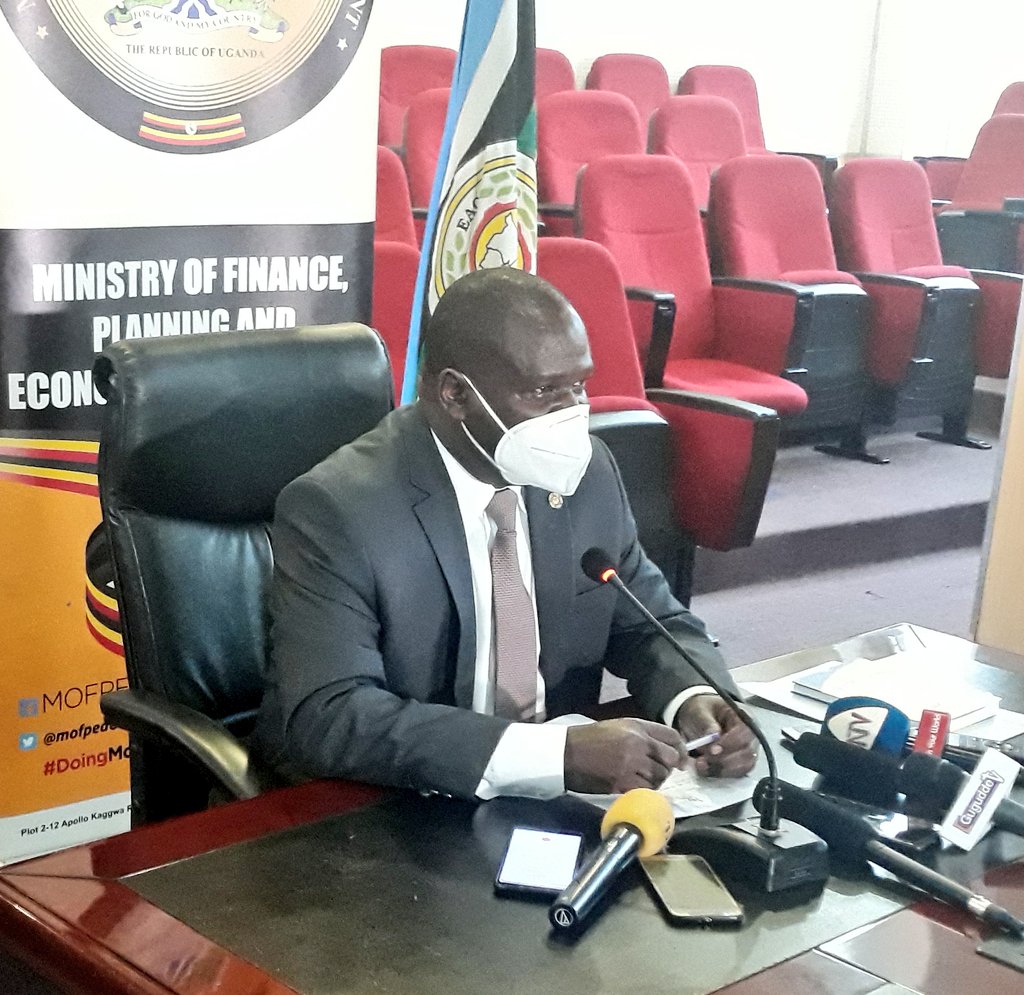
Gov’t projects a sh2Trillion revenue shortfall in the first quarter of Financial Year 2021/22 as a result of the on-going nationwide total lockdown in which businesses are closed down, the Finance Ministry Permanent Secretary/ Secretary to Treasury Patrick Ocailap has said.
He said this during the press conference at the Finance Ministry conference hall about the release of sh5.6Trillion funds for quarter one of Financial Year 2021/22.
According to him, the best mitigation to the aforementioned revenue shortfall is for all Ugandans to ensure observance of Standard Operating Procedure as guided by the Health Ministry so that the incidence of COVID 19 comes down and the economy gets re-opened.
“A shortfall of revenue is a reality, we got from Uganda Revenue Authority (URA) about sh1Trillion shortfall in revenue in June this year and we don’t expect anything better in the whole of July if the country is under lockdown. So we project the same sh1Trillion in July,” said Ocailap.
Prof. Augustus Nuwagaba, an economic transformation expert said the deficit in revenue collection, as projected by the Gov’t, is not a surprise to him since almost all businesses are under lockdown.
What should be done?
Nuwagaba said: “Now, what the Gov’t needs to do is to exercise fiscal metrics with stimulation of economic activities so that Small and Medium Enterprises (SMEs) operate with minimum standards since they comprise a bigger percentage of the private sector.”
According to him, the Government should also put in place stimulus packages for SMEs, tax waiver for businesses affected by COVID 19 lockdown so that they can recover and URA collects taxes from them.
“If lockdown continues and business closure continues, the economy may experience negative growth in this quarter. If the economy experiences negative growth of two quarters, it will go into recession,” he explained, adding that this will be as a result of subdued aggregate demand, loss of jobs and no economic activity.
Julius Mukunda, a budget expert and executive director Civil Society Budget Advocacy Group (CSBAG) said Government should only spend on core items such as payment of salaries, equipping the health sector, security as well as relief to vulnerable populations.
“The revenue shortfall isn’t a surprise at all. I would only be surprised if the Government continues spending normally yet we are in an abnormal situation. Government must re-prioritize expenditures and focus on essential areas,” he stated.
On economic recession, Mukunda said the Government should do whatever it takes and ensure that the economy doesn’t go into recession. He said more focus should be on social protection of the population hence creating demand for goods and services.
Financial year 2021/22 second quarter priorities
The sh5.6Trillion which Gov’t released, according to Ocailap represents 25% of the approved budget (excluding external financing, appropriation in aid, and public debt.
The expenditure priorities according to him include funding to meet expenditure priorities to manage COVID -19, security, provision of funds to agricultural institutions in line with budget strategy and funding to cater for certificates for on-going contracts for key capital development projects under roads, water and energy.
Recurring issues impacting budget execution
Citing the Auditor General’s report for FY 2019/20, Ocailap warned Accounting Officers against poor project implementation, under absorption of loans, misappropriation of funds and domestic arrears.
On loan projects absorption, he said: “The Ministry is taking a review of all projects to especially non performing projects to minimize interest costs and commitment fees by Government.







